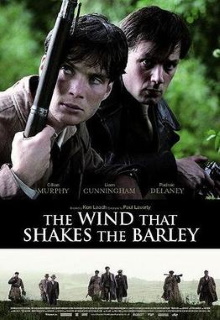
So far we’ve watched two films by Ken Loach, Kes, which we loved, and I, Daniel Blake, which I thought was the product of a director out of touch with the times. This film about the Irish War of Independence and the Civil War immediately after is much closer in quality to Kes and I suppose that reflects the director’s greater affinity for the period. But it still is rather hamfisted with its political messaging and I think a little biased in the director’s insistence on how much of the disagreement was founded on fighting for socialism.
In 1920, Damien O’Donovan is newly graduated doctor in Ireland whose brother Teddy is a local leader in the Irish Republican Army fighting against the British. Even after a raid in which one of his friends is killed, he resists joining up himself, arguing that the British are too strong. However he changes his mind after he witnesses the crew of a train being brutalized for refusing to transport British soldiers. After some training, he participates in various missions that involve ambushing and killing British soldiers. They are even captured and Teddy is tortured but they manage to escape due to the actions of a sympathetic half-Irish soldier. Damien’s conscience is particularly tested when in the course of identifying a traitor who informed on them, he is ordered to execute a young boy he has known all his life. Eventually the stiffness of their resistance brings about a peace treaty between the British and the Irish but not all of them are willing to accept the terms of the treaty.
The story of these two brothers are fictional but the historical background of their struggle is real and the details ring true as well. Loach is astonishingly good at conveying to the audience a reasonably complete picture of what went on in Ireland during this period, both on the national stage and at the local level. The range of the emotions that is captured is superb from the helpless frustration that they feel when subjected to British brutality to Damien’s anguish when he is forced to kill one of his own. I particularly liked how they show that it is not easy to get their barely trained recruits to kill. The film doesn’t pretend either that what they do, ambushing soldiers when they have little hope of fighting back, is pure savagery though their leaders justify it by claiming that they have no chance of winning otherwise. Damien even wonders if the brutality that they have to resort to is worth is. The battle scenes are well shot, giving the audience a perfectly clear idea of what is going. This is just a masterful film on multiple levels.
I’d take some points off for a number of flaws however. Using the story of two brothers who end up on opposite sides of the struggle after a peace treaty with the British is signed is very dramatic. Yet it is also very on the nose especially when they have the Pro-Treaty forces raid the very same house that they witnessed the British targeting earlier in the film. Then there’s how the director has a sympathetic character soapbox on why it’s meaningless to settle on a peace without an accompanying socialist revolution to overthrow the capitalist class. From what I understand, there was indeed a socialist element in the uprising but I’m not sure that it played as central a role in rejecting the peace treaty as the director would have it here. Loach’s personal bias is even more conspicuous in that his sympathies clearly lie with the Anti-Treaty side and so the film is completely silent on the fact that Ireland did indeed eventually become a republic as Teddy envisaged.
I’d still recommend this as a fantastic film and it did make me realize that I know less about Ireland’s history than I thought I did. It’s also surprising that Loach is quite competent at filming decent action scenes, a talent that I wouldn’t have expected of him. Even so I believe that his strong anti-establishment views gets in the way of its quality. It’s a bit of conundrum I suppose. He would not have been so motivated to make such a film if not for how strongly he feels yet the less than subtle sermonizing here works against the effectiveness of its message.
One thought on “The Wind That Shakes the Barley (2006)”